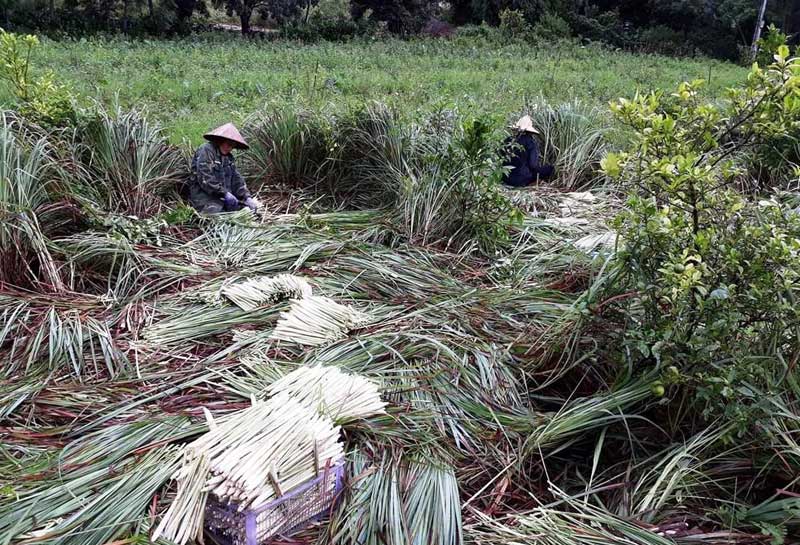
(HBO) - Hung Thi is one of the six difficult communes of Lac Thuy district, 90% of its population are Muong ethnic minority people. Their lives are still very difficult, and the economy is mainly dependent on forestation and livestock. Recognizing the economic benefits of lemongrass and its stable market consumption, the Committee and authorities of Hung Thi commune propagated and mobilized the local people to put lemongrass plants into growing on the land area of riverbank and hills. This makes the life of the farmers become quite well.

Lemongrass brings the income to the local
people of Tram village, Hung Thi commune
Talking to Mr. Pham Van Toan, the Head of
Tram village, we learn that: Up to now, the whole commune of Hung Thi has over
100 hectares of planting short hybrid lemongrass. This kind of plant is easy to
grow, easy to care, with nearly no disease; it can give high yield with the
time from planting to harvest of only 4.5 - 5 months. Two months later, another
crop can be collected. The harvesting period of lemongrass to be replanted is
after 3 years. On average, 1 hectare of lemongrass will be harvested for 5-7
crops, after deducting all the expenses, the farmers can earn the profit from
100-140 million VND / hectare.
For the people of Tram village, the village
9, the hamlet 8 and Mang village, at present, some house have about from some
perches to 1 hectare planting lemongrass, some other houses have up to 5 - 7
hectares. All products were collected by Mr. Pham Van Toan, the Head of Tram
village with prices ranging from 6,000 to 6,500 VND / kg, then they will be
sold to major wholesale markets in Hanoi and Vinh Phuc. According to Toan's
share, on average, he buys more than 2 tons of lemongrass roots every day. For
the months prior to Tet holiday, there are some days he collected dozens of
tons of lemongrass, but that amount didn’t meet the need of the market. In
addition to growing lemongrass in river banks, replacing the field bottom
planting vegetables before, lemongrass is also planted at the edge of the roads
or hill areas; it can be planted scattered in the fruit trees to help limit
weeds and increase the income for the local people.
In Lac Thuy district, communes have been succeeded in promoting their One Commune-One Product (OCOP) products while others are still struggling to position their typical farming products in market. Some communes in the district still fail to have their products met OCOP programme’s requirements, while others have seen their certifications expired.
The inspectorate agency of Hoa Binh province has issued Official Dispatch No. 1090/TTr-PCTN to provincial departments, agencies, localities, business associations, enterprises, and investors regarding measures to improve informal component indexes of the Provincial Competitiveness Index (PCI).
Hoa Binh is taking concrete steps to improve its investment environment, with a strong focus on supporting businesses, settling obstacles for strategic investors, and creating opportunities for robust development in the coming years.
Under the blazing early summer sun, the construction site of Nhuan Trach Industrial Park (IP) in Luong Son district is abuzz with activities from dawn to dusk, a testament to the determination of the investor to meet their construction targets on schedule.



